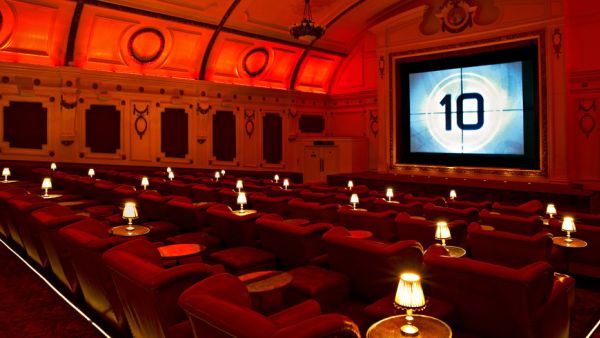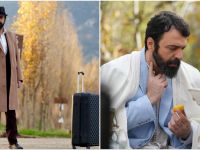The cinema has become an integral part of the UAE’s culture, and the thriving scene gets another boost through events such as the Dubai Film Festival as well as international filmmakers choosing the UAE as the setting for their movies.
While commercial films such as The Fast and the Furious and Mission Impossible have done their bit to enhance the cinema scene in the country, independent cinema is still a rarity in the UAE, but that is set to change, thanks to the efforts of an Emirati woman.
Butheina Kazim, a 30-year-old film-lover from Dubai, is determined to bring the flavour of independent films — something that she experienced while living abroad — to the UAE.
Butheina co-founded Cinema Akil in 2014, which she describes as “an independent cinema platform dedicated to bringing the best in international independent world classic cinema to audiences in the UAE”.
It might sound clichéd, Butheina says, but she started Cinema Akil for the love of films. “I felt the city was at a point where all these people were very active in the arts circles and the creative industry. A lot of new energy is returning to the city. People needed a place to congregate and have interesting conversations, share stories, learn about each other and find a window to other cultures and ideas,” she says. “For me, films are the best way to do that.”
The minute she starts talking about films, you know how much she loves them. She seems to know every film, the year it was made and even its director by heart. “Cinema connects people in a way no other medium can. I think it’s very unique in that way.”
In the years Butheina spent in Montreal, Toronto and New York, she was introduced to a lifestyle in which films were an essential talking point.
She developed a fondness for pop-up events and gatherings at independent film screenings.
But when she returned to the UAE, the dearth of such events and gatherings left a big hole in her life.
So Butheina started working on the idea of recreating that lifestyle in her home country. “I felt Dubai was ready for it. There were a lot of films, so many stories being told.”
One thing that Butheina was clear about, though, was not to copy those events abroad, but to create something that was suited to this country and its culture.

Butheina Kazim: Cinema connects people in a way no other medium can.
“The UAE is one of the biggest contributors to filmmaking in the Arab world — to contemporary independent films. I felt that there was a need to create a space where those films could be screened, to allow for conversations around them and give people a chance to get to know the filmmakers beyond film festivals,” she says.
“Film festivals are doing great in Abu Dhabi and Dubai — primarily in Dubai — but that’s for a limited time. There has to be a consistent home for cinema and consistent time for conversations. That, in a way, is a big reason why we did it.”
Cinema Akil: A4 Space in Alserkal Avenue, Al Quoz
Besides the regular pop-up programmes, Cinema Akil found a more permanent home at A4 Space in Dubai’s trendy arts and culture hub Alserkal Avenue. “A4 Space is a very important partner for us. It’s a destination, rather than just a temporal cinema experience.”
Unlike most contemporary spaces, which don’t have much room for relaxation, A4 Space has big, cosy seats in a small screening room with a modern ambience. As a result, the atmosphere here is inviting, steeped in creativity. The space has also enabled Cinema Akil to have long-running programmes, which is key to the culture that Butheina is trying to develop.
A collaboration with Alserkal Avenue, her first extensive programme this year, Here Comes the Sun, was held in summer.

Cinema Akil at Al Serkal Avenue, Al Quoz, Dubai
It looked at films from the perspective of living in a city such as Dubai during summer. “The line-up comprised films that dealt, in some way or the other, with the idea of the Sun,” says Butheina. Cinema Akil’s latest extensive programme — also in collaboration with Alserkal Avenue — Where We Dwell, started at the end of October and will be running until March 2016.
“Where We Dwell explores the ideas of home and belonging and what it actually means to have a home or to call a place home. Is it actually a physical space? Is it an idea in our heads and our hearts? Is it our relationships? What does it mean when you don’t have that kind of a physical set-up. It also looks at ideas such as homelessness,” she says.
The event has a wide range of films, from old Hollywood classics to the new Middle Eastern films.
While you have The West Side Story and Fountainhead being screened, there are recent ones such as the 2014 short film Walls and a 2008 documentary by Rem Koolhaas, A Kind of Architect.
Butheina likes to experiment and doesn’t always screen films that are deemed “successful”. In her view it is important to show films that deal with important topics as well as classics that people would “watch over and over again”.
One such selection is an American documentary called The Home Stretch. It follows the story of four homeless children who are trying to get through high school and documents their day-to-day challenges and battles.
Though the documentary would not be called a “success”, Butheina feels its theme is such that people in Dubai should see the film and appreciate its message.
“Another film we are showing is a home-grown story, a very important story. Champ of the Camp was screened internationally at some of the big festivals but didn’t necessarily get much critical acclaim.
Nonetheless, it’s very unique in its subject — labour camps in the UAE. Its director Mahmoud Kaabour is of Lebanese origin but he is very much a UAE director, and this is very much a UAE story,” Butheina says.
Pop-up programmes
While Alserkal Avenue holds film conversations every week, Cinema Akil continues with its pop-up programmes around the country. A variety of events have been organised around Dubai and Sharjah so far, and Butheina promises that an Abu Dhabi programme is on the cards.
Butheina’s passion for pop-up events makes her constantly push the boundaries and try new ways of attracting audiences. During the Dubai Art Week, Cinema Akil set up a small “under-construction” cinema in Alserkal Avenue and screened films that dealt with space and construction.
“It was a film programme but it was also an installation. It was a creative atmosphere with conversation around it and allowed people from the world of arts to engage with films as well,” Butheina says.
However, Butheina’s efforts have had their fair share of challenges, from persuading venues to clear screening rights to promoting an idea that is not yet understood by the general public. “It been a challenge to get partners who understand the importance of clearing rights. It’s not as simple as buying a DVD and putting it on.”
One of her biggest battles is trying to change the culture of not going through proper channels or paying screening rights. There’s a lack of understanding that not paying screening rights affects the life cycle of films as well as theatrical venues.
Pressing on
“We are sticklers for this rule. This culture has to change. It won’t happen overnight but we are going to continue fighting for this. We are going to press on to ensure that every event we do follows this, because that is what builds an industry and supports filmmakers. And it crea tes support for the continuity that this venue is supposed to have.”
The young entrepreneur has many plans for her art-house cinema. On top of the list are more pop-ups.
“I am looking forward to more collaborations, more programmes and more experimentation. That’s something that excites me about pop-ups. You can overcome the physical constraints of a theatre and do a lot of exciting things,” she says.
Butheina hopes that she can build Cinema Akil into a culture and in the process, learn more about what the UAE audience is hungry for.
“It’s not just about what we want to show," she said, "but also about responding to audiences in Dubai and in the UAE, and learning what they want. We want to learn about what is specific about cinema here and how it functions rather than trying to bring the idea of art house or independent cinema the way it works at other places.
"We want to create a home-grown concept and a film programme that is based around the stories and experiences here. That’s the most exciting thing for me,” she says.
By Sarvy Geranpayeh








